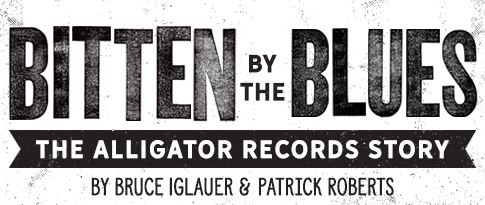
David Lee Watson, Professor Longhair, Dr. John, and Bruce Iglauer at Sea Saint Studios – Photo by Michael P. Smith.
The success of Alligator is an inspiring tale, because blues, considered one of the great American music forms, once was called dead as a vital contemporary style — replaced by rock. But Alligator has proved that wrong, and in the process become one of the classic American blues labels.
STEVEN ROSEN / CITYBEAT
Raised in Cincinnati, Iglauer’s new book (co-written with Patrick A. Roberts) “Bitten by the Blues: The Alligator Records Story” was released this fall.
As 2018 ends, “Best Recordings” judgments are being brought forth from all quarters — and Alligator Records is once again making its presence felt on Blues lists. For instance, Elvin Bishop’s Big Fun Trio is up for a Best Traditional Blues Album Grammy for Something Smells Funky ’Round Here.
The Chicago-based Alligator, which was founded in 1971 by Cincinnati-raised Bruce Iglauer, gets a lot of credit for reenergizing Blues as vital, contemporary “genuine house rockin’ music,” to quote its motto. And now Iglauer, with co-writer Patrick A. Roberts, tells the story of how that happened in his new book Bitten by the Blues: The Alligator Records Story (The University of Chicago Press).
“I am not the savior of the Blues,” Iglauer says in a telephone interview. “The Blues itself is the savior of the Blues. I like to see myself as the bridge connecting the artists with their potential audience. But I’m not the only bridge, so that if I’m at some point unable to do this the music has too much strength to die.”
The success of Alligator is an inspiring tale, because Blues, considered one of the great American music forms, once was called dead as a vital contemporary style — replaced by Rock. But Alligator has proved that wrong, and in the process become one of the classic American Blues labels. It has released some 330 titles featuring more than 100 artists to date, as its definition of Blues evolves and broadens with time. Besides Bishop’s Grammy-nominated album, its other more heralded 2018 releases include America’s Child by Shemekia Copeland; Journeys to the Heart of the Blues by Joe Louis Walker, Bruce Katz and Giles Robson; The High Cost of Low Living from the Nick Moss Band featuring and Dennis Gruenling; and Rough Cut by Curtis Salgado and Alan Hager. …But living here did afford Iglauer a chance to explore and discover music outside the Pop and Rock mainstream. In 1965, using his high-school newspaper press pass, he saw John Coltrane perform at the Ohio Valley Jazz Festival at the old Crosley Field. “Looking back, I realize his performance had all the raw passion that I later discovered in the Blues,” he writes in Bitten by the Blues.
Attending Lawrence University in Appleton, Wisconsin, Iglauer got interested enough in Blues to arrange a concert for his school’s homecoming with Howlin’ Wolf, a powerful and influential Chicago bluesman who recorded for that city’s Chess label. And on his own, he subsequently promoted a show by Blues guitarist Luther Allison.
Iglauer started coming to Chicago and befriended (and eventually worked for) Bob Koester, who operated the small Jazz and Blues label Delmark Records as well as the Jazz Record Mart. With Koester as a guide, he started attending African-American clubs on the South Side and West Side.
“So Bob opened doors to this music that a lot of white people didn’t have any idea existed at all,” he says. “Nothing in my life would have told me there were taverns all over the big cities of the country where people were playing Blues to people who grew up with the Blues.”
From there, Iglauer discovered Alligator’s first act, Hound Dog Taylor and the HouseRockers, whom he loved for their energy. They became a surprise hit at colleges and on the FM Rock and Freeform stations of the early 1970s. (Taylor died in 1975.)
“I hadn’t planned much beyond trying to make my favorite band into something more than three guys who played for very little money on the South Side of Chicago,” he says of the decision to record Taylor. “The fact they were so raw reminded people of pretty edgy Rock & Roll — I’d say pre-Punk. There were heavily distorted guitars, driving rhythms … even I could dance to it. So I had great luck with the right band at the right moment.”
Iglauer’s book is observant about how the Blues now attracts many fans that have come to it from older Rock recordings, especially those of the “guitar heroes” in vogue from the 1960s-80s, like the late Stevie Ray Vaughan. …
By Steve Rosen. Read his full “Alligator Records’ Bruce Iglauer has the blues –and that’s a good thing” story at CityBeat.

